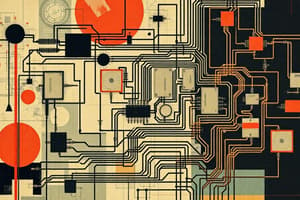Podcast
Questions and Answers
What is the decimal equivalent of the binary number 1101101101?
What is the decimal equivalent of the binary number 1101101101?
- 3289
- 1289
- 289
- 2289 (correct)
How many diodes are needed in a center-tap full wave rectifier?
How many diodes are needed in a center-tap full wave rectifier?
- 3
- 4
- 2 (correct)
- None of the above
In which condition should the base-emitter junction and collector-base junction be biased for a transistor to operate as an amplifier?
In which condition should the base-emitter junction and collector-base junction be biased for a transistor to operate as an amplifier?
- Forward bias, Forward bias
- Forward bias, Reverse bias (correct)
- Reverse bias, Forward bias
- Reverse bias, Reverse bias
What is the dynamic (ac) resistance of a Zener diode?
What is the dynamic (ac) resistance of a Zener diode?
Which device is expected to have the highest input impedance?
Which device is expected to have the highest input impedance?
In a BJT with both junctions forward-biased, which region is it operating in?
In a BJT with both junctions forward-biased, which region is it operating in?
The point where the d.c. and a.c. load lines intersect is called what?
The point where the d.c. and a.c. load lines intersect is called what?
What is the primary function of a clamper circuit?
What is the primary function of a clamper circuit?
Flashcards
Binary to Decimal Conversion
Binary to Decimal Conversion
A binary number is converted to its equivalent decimal representation. For example, 1101101101 in binary is equal to 2289 in decimal.
Center-tap Full Wave Rectifier
Center-tap Full Wave Rectifier
A full-wave rectifier uses two diodes to convert AC to DC. The center-tap configuration requires only two diodes because they are switched on and off by the AC signal.
BJT Amplifier Operation
BJT Amplifier Operation
A transistor acts as an amplifier when the Base-emitter junction is forward biased (allowing current flow) and the Collector-base junction is reverse biased (blocking current except through the base current flow)
Operating Point (Q-point)
Operating Point (Q-point)
Signup and view all the flashcards
Clamper Circuit
Clamper Circuit
Signup and view all the flashcards
MOSFET Amplifier
MOSFET Amplifier
Signup and view all the flashcards
Crystal Oscillator
Crystal Oscillator
Signup and view all the flashcards
BJT Function
BJT Function
Signup and view all the flashcards
Study Notes
Analog and Digital Electronics - Group A
- Binary number 1101101101 is equal to decimal 2289.
- Minimum diodes in a center-tap full-wave rectifier is 4
- Transistor operation as an amplifier: Base-emitter junction requires forward bias, and collector-base junction forward bias for proper operation.
- Zener diode dynamic resistance: Nearly zero
- Highest input impedance device: MOSFET and JFET
- BJT operating region (forward/forward): Saturation
- Intersection of DC and AC load lines: Operating point
- Full-wave rectifier ripple factor: 0.48
- Shift register construction: SR, JK, D, or T flip-flops.
- Clamper circuit function: Lower the negative half cycle of a signal to introduce a DC level in AC.
- Transformer coupling in class A amplifier: Reduces distortion
- MOSFET amplifier region: Linear
- High-stability oscillator: Crystal oscillator
- D-flip-flop standard form: Data
- BJT function: Voltage control current source
Studying That Suits You
Use AI to generate personalized quizzes and flashcards to suit your learning preferences.




